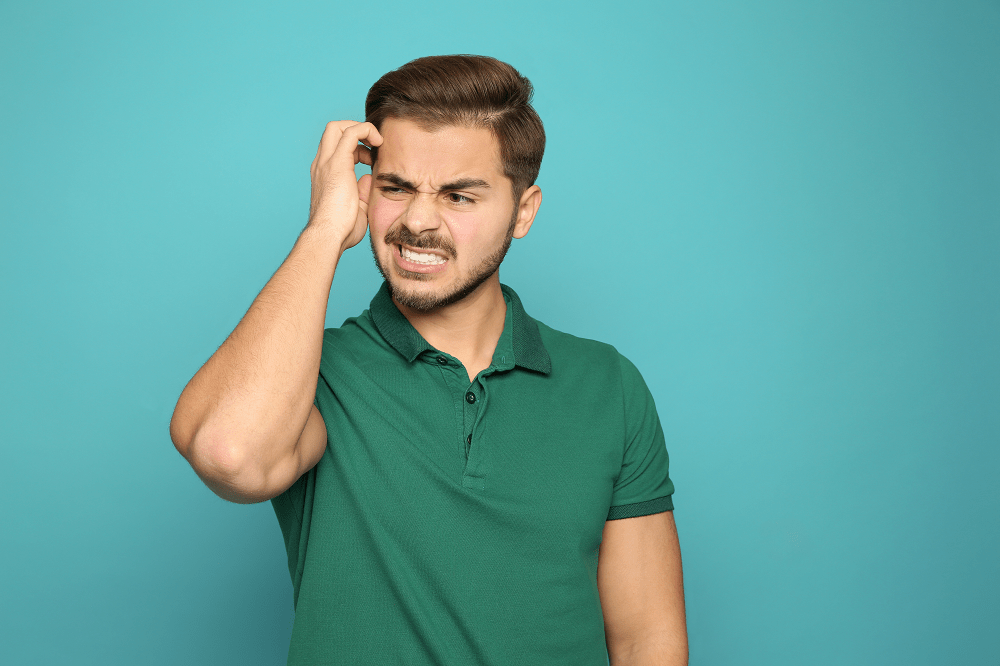
Cuero cabelludo irritado picor y dolor -Soluciones
Al hablar de problemas capilares tendemos a pensar solo en el pelo, y aunque es verdad que el cabello es la parte más visible y que enseguida percibimos como dañada, no debemos olvidar que el cuero cabelludo juega un papel fundamental en la salud capilar. En él se encuentran insertados los folículos pilosos y por eso debe cuidarse si se quiere tener una melena fuerte y saludable.
El cuero cabelludo es una zona muy sensible y expuesta, por lo que es común sentir en alguna ocasión picor o escozor. Además, contiene gran cantidad de vasos sanguíneos y terminaciones nerviosas, por lo que un cuero cabelludo sensible puede causar molestias importantes en el día a día.

¿Qué causa el picor del cuero cabelludo?
El picor del cuero cabelludo está directamente relacionado con la psoriasis y la dermatitis seborreica (eczema del cuero cabelludo), así como la presencia de hongos. En los casos más leves, se trata de una simple piel irritada (dermatitis leve).
Además, el uso de champús y productos capilares de poca calidad o inadecuados también puede provocar la aparición de picor e irritación, así como un secado a altas temperaturas. Por eso siempre destacamos la importancia de elegir productos adecuados y con una buena formulación, como los que tenemos en la tienda online de Insparya.
¿Qué significa cuero cabelludo sensible?
Los síntomas de un cuero cabelludo sensible pueden incluir ardor, hormigueo, dolor, entumecimiento, palpitaciones, picor y enrojecimiento. A veces, simplemente notamos que está tenso y pica. Además, un cuero cabelludo irritado puede llegar a provocar la descamación de la piel.
La sensibilidad del cuero cabelludo varía según la persona. Puede ser más frecuente e intensa, por ejemplo, en quienes tienen el cuero cabelludo seco o graso y en aquellas que sufren de sequedad y necesitan hidratación. Asimismo, las personas con sensibilidad en el cuero cabelludo suelen tener la piel sensible en otras zonas del cuerpo.
Si los síntomas son graves, es posible que se trate de un cuero cabelludo hiperreactivo. Tanto si el tuyo es un caso leve como uno más agudo, la clave es identificar qué causas están detrás de esa sensibilidad.
Aunque son términos similares, cuero cabelludo irritado e irritable no son exactamente lo mismo. El cuero cabelludo irritable se trata de un cuero cabelludo sensible y se suele asociar, normalmente, a diferentes tipos de caída, como el efluvio telógeno. El cuero cabelludo irritable o sensible suele afectar a personas con especial sensibilidad en la piel, y se suele asociar a la caída del pelo. Aunque menos habitual, también puede asociarse a la alopecia androgénica.
Los tratamientos que se aplican en este tipo de casos suelen ser los mismos tratamientos empleados para evitar la caída provocada por el efluvio telógeno. Otra solución sencilla y que puede ser eficaz para algunas personas es utilizar champús específicos para este problema, como el champú Dermocalm de Insparya.

¿Qué puede irritar y dañar el cuero cabelludo?
No solemos pararnos a pensar en qué factores o elementos puede irritar y dañar nuestro cuero cabelludo hasta que empezamos a notar molestias. Es importante recordar que, tanto el cabello como el cuero cabelludo, son importantes indicadores de cómo es nuestro estado de salud general, por lo que debemos prestarles atención.
Hay muchos factores que pueden afectar la salud de tu cabello, sea del tipo que sea. Algunos de ellos pueden tener que ver con nuestros hábitos, como son la forma en que lavamos el pelo, cómo lo peinamos o qué productos y tratamientos aplicamos.
Por fortuna, muchas de estas causas pueden evitarse si se conocen. Veamos algunas de ellas:
- Fijadores para el cabello
Algunos productos cosméticos pueden resultar perjudiciales para el pelo y el cuero cabelludo. Por ejemplo, algunos tipos de fijadores y lacas. Todo depende de los ingredientes que se utilicen en su fórmula por lo que ante la duda, es aconsejable consultar con un profesional. Entre los ingredientes más perjudiciales para nuestro cuero cabelludo que suelen incluir este tipo de productos se encuentran el etanol, los parabenos, el alcohol y las fragancias.
Además, un uso excesivo puede desencadenar la caída del cabello, al provocar la deshidratación del cuero cabelludo y al obstruir los poros, dificultando así el crecimiento de nuevos cabellos. - Tintes para el pelo
El tinte puede desequilibrar el pH de tu cuero cabelludo. Tanto si decides teñirte el pelo en casa como si acudes regularmente a un profesional, es clave elegir un buen producto. Muchos contienen amoníaco, especialmente útil para para levantar la cutícula del cabello y permitir que el tinte se filtre. Aunque esto hace que el color dure más tiempo, debilita el cabello e irrita la piel. - Decoloración
El proceso de decoloración resulta más agresivo que el tinte, porque elimina los aceites y nutrientes esenciales. El cuero cabelludo produce sebo de forma natural, que hidrata el cabello y le aporta brillo. La decoloración suele eliminar esos aceites y dejar el cuero cabelludo seco provocando irritaciones, picores y rojeces. Además, tu pelo puede acabar encrespado y seco. - Secador y plancha
El calor directo sobre el cabello puede causar daño rápidamente. Muchos de los instrumentos que utilizamos necesitan altas temperaturas para funcionar. Dos de los mayores culpables de irritación en el cuero cabelludo son el secado y el planchado. Ambas acciones absorben la humedad que necesitamos mantener para que el pelo permanezca hidratado. - Deshidratación
Tener una correcta hidratación es esencial para el buen funcionamiento de nuestro organismo y, también, de la piel y cuero cabelludo. Si no nos hidratamos bien, el cabello se debilita, lo que puede hacer que el cuero cabelludo se reseque y que el cabello se vuelva seco y sin brillo.
Beber suficiente agua también ayuda al cuerpo a eliminar toxinas. Si no tomas agua suficiente y esas toxinas permanecen en tu organismo esto puede provocar un crecimiento lento del cabello e incluso provocar su caída. - Exposición al sol
El cuero cabelludo también puede quemarse con el sol. Por eso es aconsejable proteger la cabeza con sombreros o gorros, que además pueden tener factor de protección UV para mayor seguridad.
Si nos hiciéramos la pregunta de por qué se irrita el cuero cabelludo podríamos responder, como hemos ido viendo, que el champú es uno de los principales orígenes de la sensibilidad en el cuero cabelludo para muchas personas. Los agentes limpiadores agresivos de muchos champús pueden eliminar el manto ácido del cuero cabelludo —la acidez natural que protege la piel—, y dejarlo susceptible a la sequedad y la irritación.
Asimismo, la exposición a determinadas condiciones climáticas (el sol, el frío, el calor o el viento), la contaminación o el estrés pueden provocar sensibilidad en la zona del cuero cabelludo. Tener en cuenta todos estos factores te ayudará a determinar por qué tu piel en esa zona es tan sensible y cómo mejorar su estado.
¿Qué es bueno para la irritación y el picor del cuero cabelludo?
En caso de que se determine que la causa de la irritación y el picor del cuero cabelludo está relacionada por factores externos es recomendable utilizar un champú suave, recordar aclarar muy bien el cabello y alejarnos de los productos exfoliantes para el cuero cabelludo. Además, podemos aplicar productos para aliviar el cuero cabelludo sensible. Si queremos utilizar secador lo ideal es solo a media temperatura (o frío, si posee ese modo) y a la hora de peinarnos debemos hacerlo con mucha suavidad.
Más allá de estas recomendaciones y para casos más severos una buena solución es el uso de corticoides tópicos (en solución) y champús específicos indicados para la dermatitis seborreica e irritativa. Siempre deben ser recomendados por un especialista en cuidado capilar.
Además de esto es beneficioso realizar ciertos cambios en tu rutina diaria para mejorar tu salud capilar. Entre estas recomendaciones podemos encontrar:
- Hidratar bien el cabello, también si es graso.
- Mejorar la alimentación, incluyendo frutas y verduras y agua en abundancia.
- Huir del uso durante muchas horas de gorros y cascos demasiado apretados.
- Cepillar el cabello con cepillos y peines de púas anchas.
- Realizar ejercicio regularmente para mantenernos saludables, regular el estrés y eliminar toxinas a través del sudor.
¿Cómo puedo saber si mi cuero cabelludo está irritado?
Puedes saber si tu cuero cabelludo está irritado atendiendo a los síntomas. Los más comunes son el picor, sensación de sequedad, dolor, quemazón y enrojecimiento e incluso descamación o caspa. Ante estos síntomas la piel se vuelve más frágil y es necesario tomar medidas para solucionar esa irritación. En cualquier caso debe ser un médico especialista el que determine el tratamiento a seguir.
Problemas del cuero cabelludo irritado
Los problemas y síntomas que provocan la irritación del cuero cabelludo son:
- Sensibilidad del cuero cabelludo.
- Cabello más frágil y fino.
- Picor.
- Alopecia.
- Caspa.
Soluciones para el picor del cuero cabelludo
Si has notado molestias como estas, contacta ya con Insparya y solicita una primera cita. Nuestros expertos en salud capilar estudiarán tu caso para proponerte las mejores soluciones para el cuero cabelludo irritado.




